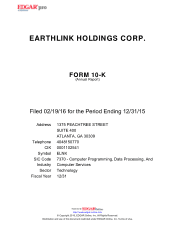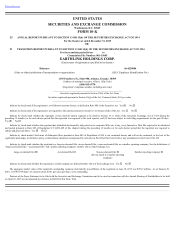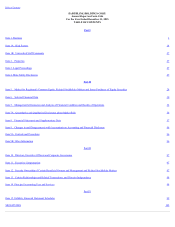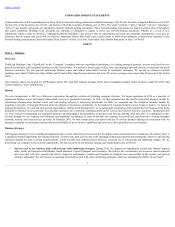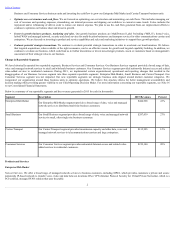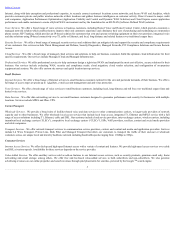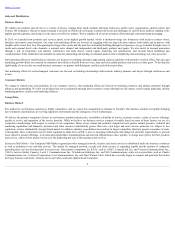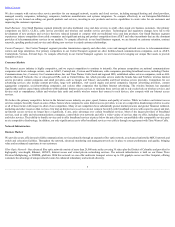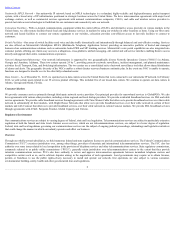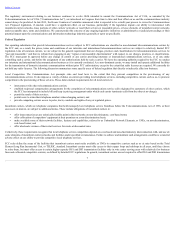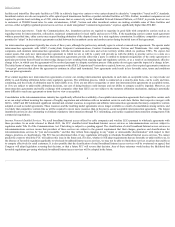Earthlink 2015 Annual Report Download - page 11
Download and view the complete annual report
Please find page 11 of the 2015 Earthlink annual report below. You can navigate through the pages in the report by either clicking on the pages listed below, or by using the keyword search tool below to find specific information within the annual report.
Table of Contents
facilities and interoffice fiber optic facilities as UNEs in relatively large wire centers or wire centers deemed to already be “competitive” based on FCC standards.
Incumbent carriers are also not required to offer optical speed transmission facilities or packet-switched facilities as UNEs. Further, incumbent companies are not
required to provide local switching as a UNE, which means that we cannot rely on the Unbundled Network Element-Platform, or UNE-P, to provide local services
to customers at TELRIC-based rates. In some circumstances, AT&T, Verizon and other incumbent carriers are making available some of these facilities and
services, either as lightly regulated special access services or under unregulated “commercial agreements,” at prices significantly higher than TELRIC.
Interconnection Agreements . Under the Communications Act, incumbent carriers are required to negotiate in good faith with competitive carriers such as us
regarding terms for interconnection, collocation, reciprocal compensation for local traffic and access to UNEs. If the negotiating carriers cannot reach agreement
within a prescribed time, either carrier may request binding arbitration of the disputed issues by a state regulatory commission. In addition, competitive carriers are
permitted to “adopt” in their entirety agreements reached between the incumbent carrier and another carrier during the initial term of that agreement.
An interconnection agreement typically has a term of three years, although the parties may mutually agree to extend or amend such agreements. We operate under
interconnection agreements with AT&T, CenturyLink, Fairpoint Communications, Frontier Communications, Verizon and Windstream. Our retail operating
companies each maintain interconnection agreements with the incumbent in each state and service territory within which we purchase UNEs. We expect, but
cannot assure, that each new interconnection agreement to which we are or will be a party will provide us with the ability to provide service in a state on a
reasonable commercial basis. Many of our interconnection agreements provide either that a party is entitled to demand renegotiation of the entire agreement or
particular provisions thereof based on intervening changes in law resulting from ongoing legal and regulatory activity, or as a result of an immediately effective
change in law, in which case the agreement will be resolved pursuant to a dispute resolution process if the parties do not agree upon the impact of a change in law.
The initial terms of many of our interconnection agreements with AT&T, Fairpoint and Verizon have expired; however, each of our expired agreements contains an
“evergreen” provision that allows the agreement to continue in effect until terminated. New agreements could result in less favorable rates, terms and conditions
than our prior agreements.
If we cannot negotiate new interconnection agreements or renew our existing interconnection agreements in each state on acceptable terms, we may invoke our
ability to seek binding arbitration before state regulatory agencies. The arbitration process, which is conducted on a state-by-state basis, can be costly and time-
consuming, and the results of arbitration may be unfavorable to us. If we are not able to renegotiate or enter into interconnection agreements on acceptable terms,
or if we are subject to unfavorable arbitration decisions, our cost of doing business could increase and our ability to compete could be impeded. Moreover, our
interconnection agreements and traffic exchange with companies other than ILECs are not subject to the statutory arbitration mechanism, making it potentially
more difficult to reach any agreement on terms that we view as acceptable.
Consolidation in the telecommunications industry has significantly affected the availability of acceptable interconnection agreements that competitive carriers such
as us can adopt without incurring the expense of lengthy negotiation and arbitration with an incumbent carrier in each state. Before their respective mergers with
ILECs, AT&T and MCI dedicated significant internal and external resources to negotiate and arbitrate interconnection agreements that many competitive carriers
adopted or used as model agreements. These resources and the resulting model agreements are no longer available as a result of consolidation among carriers, and
it is likely that competitive carriers like us will be required to invest more resources than in the past to secure acceptable interconnection agreements. The largest
incumbent carriers are also attempting to eliminate mandatory interconnection through FCC rulemaking, and replace regulated interconnection arrangements with
commercial negotiations.
Internet Protocol-Enabled Services. We resell broadband Internet access offered by cable companies and wireline LECs pursuant to wholesale agreements with
those providers. In an order released in March 2015, the FCC classified retail broadband Internet access services as telecommunications services subject to
regulation under Title II of the Communications Act. That ruling is subject to a pending appeal. The classification of retail broadband Internet access services as
telecommunications services means that providers of these services are subject to the general requirement that their charges, practices and classifications for
telecommunications services be “just and reasonable,” and that they refrain from engaging in any “unjust or unreasonable discrimination” with respect to their
charges, practices or classifications. The FCC has not determined what, if any, regulations will apply to wholesale broadband Internet access services. We cannot
predict the extent to which the FCC will address this issue in the future and, if it does, whether it will adopt requirements that are favorable or unfavorable to us. In
the absence of favorable regulation applicable to wholesale broadband Internet access services, we may not be able to obtain those services on prices that enable us
to compete effectively for retail customers. It is also possible that the classification of retail broadband Internet access services will be overturned on appeal, that
Congress will adopt legislation reversing that decision, or that a future FCC will reverse that decision. Any of these outcomes would reduce the likelihood that
favorable regulations governing wholesale broadband Internet access services will be adopted in the future.
8

